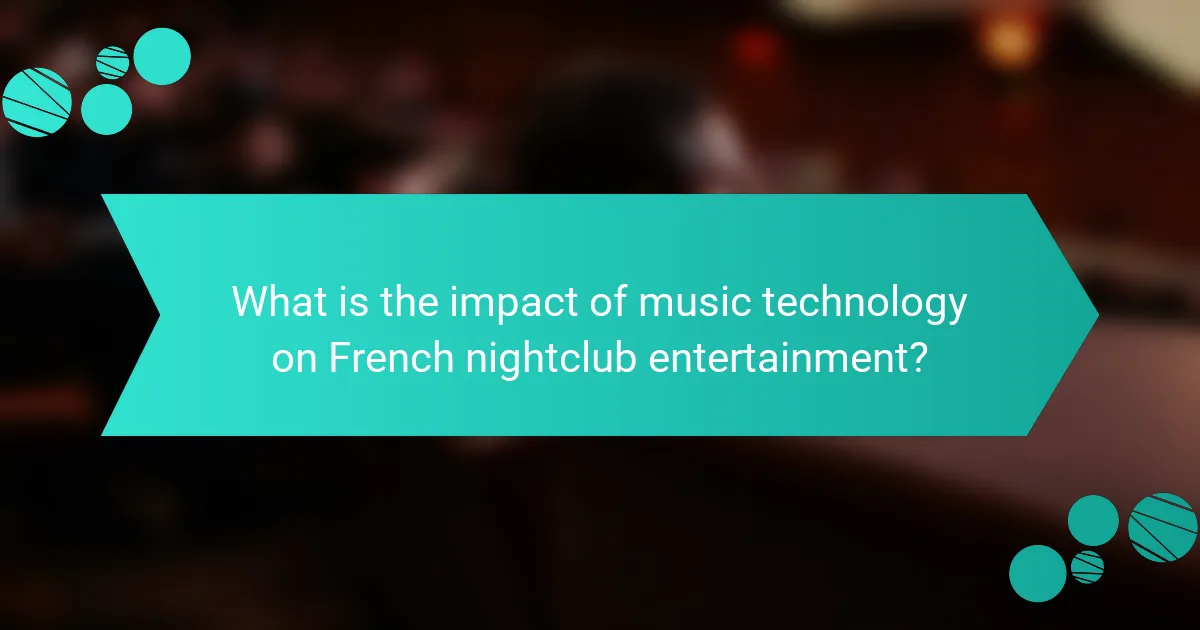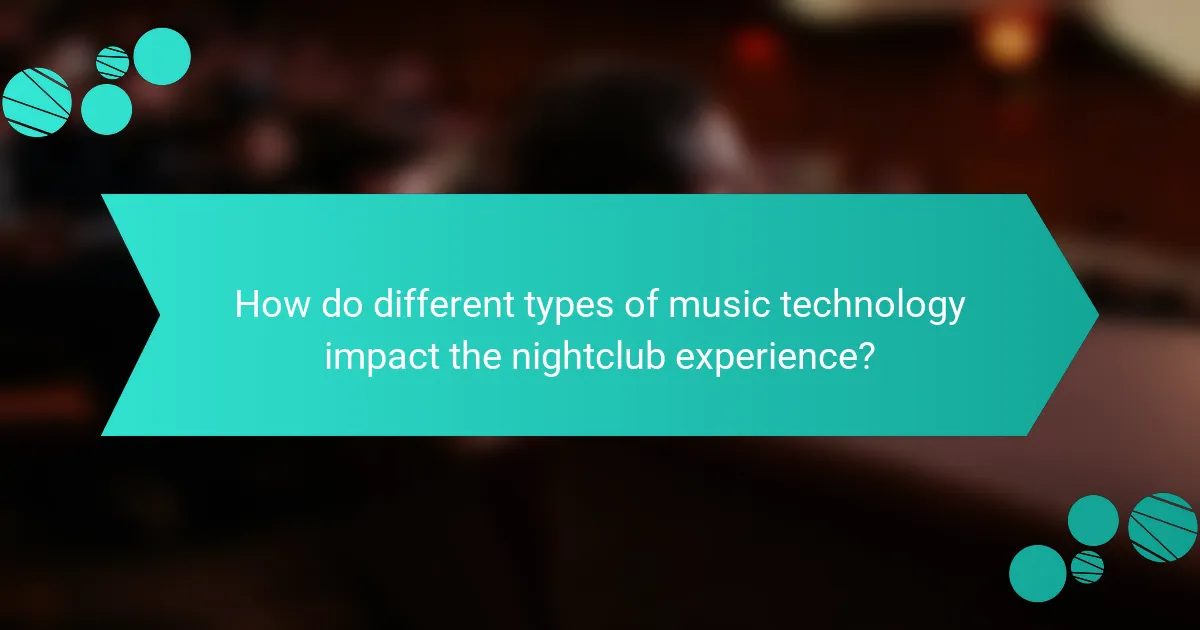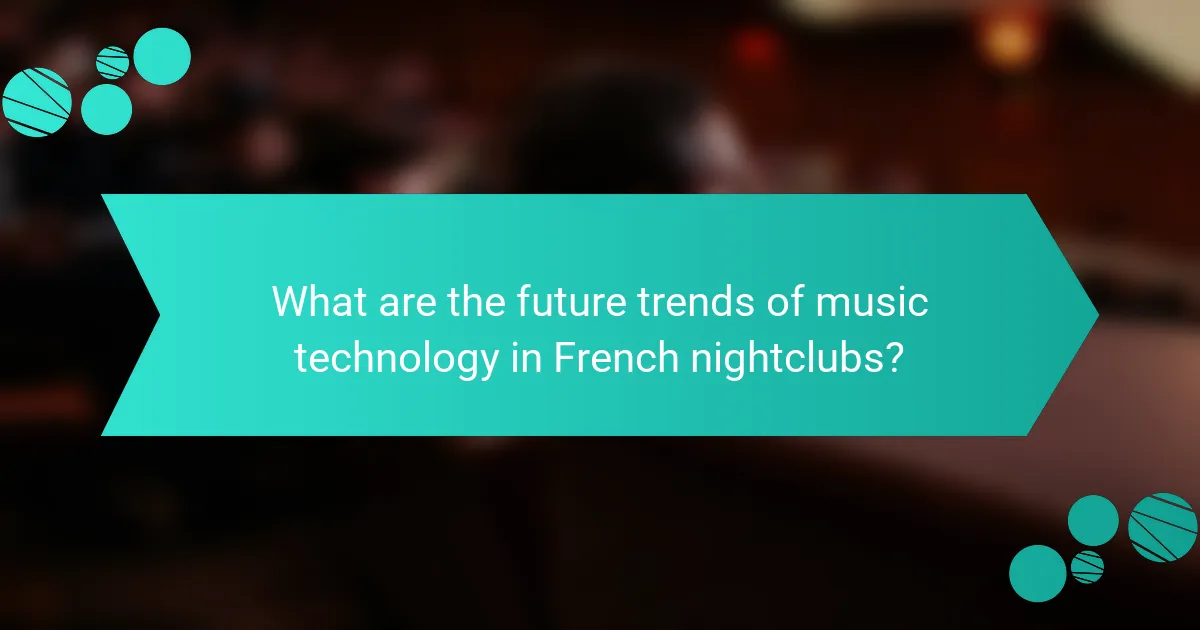Music technology plays a crucial role in enhancing the entertainment experience in French nightclubs. Advanced audio systems improve sound quality, while visual technologies like LED screens create immersive environments for club-goers. DJs leverage digital software for seamless mixing, enabling real-time adaptation to crowd preferences. Additionally, trends such as virtual reality, augmented reality, and artificial intelligence are shaping the future of nightclub experiences, emphasizing personalized and engaging interactions. The integration of these technologies not only elevates the auditory and visual atmosphere but also increases patron satisfaction and engagement.

What is the impact of music technology on French nightclub entertainment?
Music technology significantly enhances French nightclub entertainment. It improves sound quality through advanced audio systems. High-definition sound systems create immersive experiences for club-goers. DJs utilize digital software for seamless mixing and live performance. Visual technology, like LED screens, enhances the overall atmosphere. This integration of visuals and sound captivates audiences. Additionally, music streaming services provide access to vast music libraries. This accessibility allows DJs to adapt to crowd preferences in real time. Overall, music technology transforms the nightclub experience into a dynamic and engaging event.
How has music technology evolved in the context of French nightclubs?
Music technology in French nightclubs has evolved significantly over the past few decades. Initially, vinyl records and turntables dominated the scene. As digital technology emerged, CDJs replaced traditional turntables, allowing for greater flexibility in mixing. The introduction of software like Ableton Live and Traktor expanded creative possibilities for DJs.
In recent years, high-quality sound systems have become standard in nightclubs. This change enhances the overall auditory experience for patrons. Additionally, lighting technology has advanced, with LED and laser systems synchronizing with music for immersive environments.
The rise of streaming services has also influenced music selection in nightclubs. DJs now have access to vast libraries of music, enabling diverse playlists. Furthermore, mobile apps for ticketing and event promotion have streamlined operations for club owners.
These advancements collectively reflect a trend toward more interactive and engaging nightlife experiences.
What are the key innovations in music technology affecting nightclubs?
Key innovations in music technology affecting nightclubs include advanced sound systems, digital DJing software, and immersive audio experiences. Advanced sound systems provide clearer audio and enhanced bass, improving overall sound quality. Digital DJing software allows for seamless mixing and access to vast music libraries. Immersive audio experiences utilize spatial audio technology to create a 360-degree sound environment. Additionally, lighting and visual technologies have evolved, integrating with music to enhance the atmosphere. These innovations collectively transform the nightclub experience, attracting larger audiences and enhancing engagement.
How do these innovations enhance the nightclub experience?
Innovations in music technology enhance the nightclub experience by improving sound quality and audience engagement. High-definition sound systems deliver clearer audio, allowing patrons to enjoy music as intended by artists. Advanced lighting systems create immersive environments, enhancing the visual appeal of performances. Interactive elements, such as mobile apps, enable personalized experiences for attendees. These apps can facilitate song requests or share event details in real-time. Additionally, virtual reality experiences provide unique ways for patrons to engage with performances. Research indicates that enhanced audio-visual experiences can increase customer satisfaction and retention rates in nightclubs. Overall, these innovations create a more dynamic and enjoyable atmosphere for nightlife enthusiasts.
What role does music technology play in shaping nightclub culture in France?
Music technology significantly shapes nightclub culture in France by enhancing sound quality and creating immersive experiences. Advanced sound systems improve audio clarity, allowing DJs to deliver high-quality mixes. Digital tools enable real-time manipulation of music, fostering creativity and unique performances. Lighting technology synchronizes with music, amplifying the emotional impact on audiences. Additionally, software for music production has democratized access to creating tracks, encouraging local artists. In France, the integration of technology attracts diverse crowds, driving the nightlife economy. Events like the Paris Electronic Week showcase innovations, illustrating technology’s influence on the scene. Overall, music technology is a cornerstone of the vibrant nightclub culture in France.
How does technology influence the selection and mixing of music?
Technology significantly influences the selection and mixing of music through digital tools and software. These tools allow DJs to access vast music libraries instantly. Software like Serato and Traktor enables seamless mixing and beat matching. Algorithms can analyze tracks to suggest compatible songs for mixing. Additionally, technology facilitates real-time effects and transitions, enhancing the overall sound. Streaming platforms provide data on popular tracks, guiding selection. The rise of AI in music production also influences trends and choices in music curation. These advancements have transformed traditional DJ practices into a more dynamic and interactive experience.
What are the effects of technology on DJ performances and audience engagement?
Technology significantly enhances DJ performances and audience engagement. It allows DJs to access a vast library of music instantly. Digital platforms enable seamless mixing and transitions, creating a more dynamic experience. Advanced sound systems amplify audio quality, enhancing the overall atmosphere. Visual effects, such as lighting and projections, create immersive environments for audiences. Audience interaction is boosted through social media integration and live feedback mechanisms. Data analytics can help DJs understand audience preferences in real-time. Studies show that technology-driven performances increase audience satisfaction and retention rates.
What challenges does the integration of music technology present to French nightclubs?
The integration of music technology presents several challenges to French nightclubs. One significant challenge is the high cost of upgrading sound and lighting systems. Many nightclubs struggle to afford the latest technology, which can impact their competitiveness. Another challenge is the need for staff training. Employees must be trained to operate new systems effectively, which requires time and resources.
Additionally, there are concerns about the reliability of technology. Technical failures can disrupt performances and diminish the overall guest experience. Nightclubs also face the challenge of balancing live performances with DJ sets. This requires careful planning to ensure a seamless transition between different types of entertainment.
Lastly, the rapid pace of technological change can make it difficult for nightclubs to keep up. They must continually invest in new equipment and software to stay relevant. These challenges collectively impact the operational efficiency and profitability of French nightclubs.
How do nightclubs address technical issues related to music technology?
Nightclubs address technical issues related to music technology through regular maintenance and upgrades of equipment. They employ sound engineers to troubleshoot and resolve audio problems during events. Nightclubs also invest in high-quality sound systems and software to enhance audio performance. Training staff on equipment usage ensures quick responses to technical glitches. Additionally, many nightclubs utilize backup systems to prevent disruptions. For example, a secondary mixer can be activated if the primary mixer fails. This proactive approach minimizes downtime and maintains the quality of the entertainment experience. Nightclubs often collaborate with technology providers for timely support and solutions.
What are the financial implications of adopting new music technologies?
Adopting new music technologies can lead to significant financial implications for businesses. These technologies often require substantial initial investment for equipment and software. For instance, advanced sound systems and digital mixing tools can cost thousands of euros.
However, the long-term benefits can outweigh these costs. Enhanced audio quality can attract more customers, leading to increased revenue. Additionally, new technologies can streamline operations, reducing labor costs.
Studies show that nightclubs utilizing advanced music technologies report higher customer satisfaction and retention rates. This can translate into repeat business and increased profits over time.
Moreover, the ability to offer unique experiences, such as immersive sound environments, can differentiate a venue in a competitive market. This differentiation can result in higher cover charges and ticket sales.
In summary, while the initial financial outlay for new music technologies is considerable, the potential for increased revenue and operational efficiency presents a compelling case for investment.

How do different types of music technology impact the nightclub experience?
Different types of music technology significantly enhance the nightclub experience. Advanced sound systems improve audio quality, creating a more immersive environment. Lighting technology, such as LED and laser systems, synchronizes with music, elevating the visual experience. DJ software allows for seamless mixing and real-time manipulation of tracks, enhancing live performances. Digital effects and synthesizers expand creative possibilities for artists, resulting in unique soundscapes. Additionally, mobile apps enable audience interaction, allowing patrons to request songs and engage with the music selection. Research shows that nightclubs utilizing advanced technology see increased patron satisfaction and longer visits. This data underscores the importance of music technology in shaping the overall nightclub atmosphere.
What are the various forms of music technology used in French nightclubs?
French nightclubs utilize various forms of music technology to enhance the entertainment experience. Key technologies include digital audio workstations (DAWs) for music production. These tools allow DJs to mix and manipulate tracks seamlessly. Additionally, lighting systems create immersive atmospheres, often synchronized with music. High-quality sound systems ensure clarity and depth in audio playback. Live performance technology, such as MIDI controllers, enables real-time music creation. Video projection systems are also common, enhancing visual engagement. Furthermore, streaming services provide access to vast music libraries. These technologies collectively shape the unique nightlife experience in French clubs.
How do sound systems enhance the auditory experience for club-goers?
Sound systems enhance the auditory experience for club-goers by delivering high-quality audio that amplifies music and effects. These systems provide clear sound reproduction across various frequencies. This clarity allows club-goers to fully engage with the music. A well-designed sound system minimizes distortion, ensuring that every beat is felt. Additionally, sound systems create an immersive environment through spatial audio effects. This enhances the overall atmosphere of the club. Research shows that quality sound systems can elevate a club’s ambiance, leading to longer patron stays. According to a study by the Journal of Sound and Vibration, high-quality sound systems significantly improve listener satisfaction in nightlife settings.
What role do lighting and visual technologies play in nightclub entertainment?
Lighting and visual technologies are essential in nightclub entertainment. They create immersive environments that enhance the overall experience for patrons. Dynamic lighting can synchronize with music, elevating the emotional impact of performances. Visual displays, such as LED screens, provide captivating visuals that engage attendees. Studies show that well-designed lighting can increase patron satisfaction and encourage longer stays. For instance, a survey by the Nightclub & Bar Media Group found that 70% of club-goers believe lighting affects their enjoyment. Additionally, visual technologies can be used to convey themes or concepts, making events more memorable. Overall, these technologies play a crucial role in shaping the atmosphere and energy of nightclub experiences.
How do music streaming services influence nightlife in France?
Music streaming services significantly influence nightlife in France by shaping music consumption patterns. They provide easy access to a vast library of songs, allowing users to discover new artists and genres. This accessibility encourages DJs and club owners to curate diverse playlists that appeal to a wider audience. Popular platforms like Spotify and Deezer also offer features like personalized playlists, which enhance the user experience.
Additionally, streaming services often promote emerging talent, leading to a shift in the artists featured in nightlife venues. Many clubs now host events centered around trending playlists or viral songs. This trend aligns with the growing importance of social media in promoting nightlife events.
As a result, music streaming services have transformed how people engage with nightlife, making it more dynamic and responsive to current musical trends.
What are the benefits and drawbacks of using streaming services in clubs?
Streaming services in clubs offer both benefits and drawbacks. Benefits include access to a vast library of music, allowing DJs to easily find and play diverse tracks. This can enhance the club’s atmosphere and cater to varied audience preferences. Streaming services often provide high-quality audio, improving the overall sound experience. Additionally, they can reduce the need for physical media, streamlining music management.
However, drawbacks exist as well. Streaming services require a stable internet connection, which can be unreliable in some venues. This dependency can lead to interruptions during performances. Licensing issues may also arise, as not all tracks are available for public performance. Furthermore, reliance on streaming can limit a DJ’s creativity and personal touch, as they may lean on familiar playlists rather than curating unique sets.
How do DJs integrate streaming platforms into their performances?
DJs integrate streaming platforms into their performances by using real-time access to vast music libraries. This allows them to curate playlists dynamically during sets. They can also incorporate live streaming to reach wider audiences beyond the venue. Many DJs utilize software that connects to platforms like Spotify or SoundCloud for seamless track integration. This enhances their ability to remix and mashup songs on the fly. Furthermore, streaming platforms often provide analytics that help DJs understand audience preferences. This data can inform future performances and setlists. Overall, streaming platforms significantly enhance the versatility and reach of DJs in live settings.

What are the future trends of music technology in French nightclubs?
Future trends of music technology in French nightclubs include immersive audio experiences and advanced DJ software. Nightclubs are increasingly adopting surround sound systems to enhance the auditory experience. Virtual reality (VR) and augmented reality (AR) are being integrated for interactive performances. Artificial intelligence (AI) is being utilized for music curation and personalized playlists. Blockchain technology is emerging for secure transactions and artist royalties. These trends reflect a shift towards more engaging and personalized nightclub experiences. The integration of these technologies is supported by industry reports highlighting growing investments in audio-visual innovations.
How is virtual reality shaping the nightclub experience?
Virtual reality is transforming the nightclub experience by creating immersive environments. These environments engage attendees in unique ways. Users can interact with digital elements while enjoying music. This enhances the overall sensory experience. VR technology allows for virtual performances by artists. This expands access to live events beyond physical limitations. Research shows that 67% of users report higher satisfaction with VR experiences. Virtual reality also enables themed parties that change dynamically. These innovations attract a younger, tech-savvy audience.
What potential does augmented reality hold for enhancing entertainment?
Augmented reality has significant potential to enhance entertainment experiences. It can create immersive environments that engage users in new ways. For instance, AR can overlay digital elements onto real-world settings, transforming how audiences interact with content. This technology allows for interactive storytelling, where users can influence narratives through their actions. In live performances, AR can enhance visual effects, making shows more captivating. According to a study by PwC, AR can increase audience engagement by up to 50%. This indicates its effectiveness in entertainment sectors, including music and nightlife. Overall, augmented reality offers innovative opportunities for enhancing audience experiences in entertainment.
How might artificial intelligence transform music selection and DJing?
Artificial intelligence may transform music selection and DJing by enabling personalized playlists and real-time mixing. AI algorithms can analyze audience preferences and mood, tailoring music selections to enhance the experience. Machine learning models can predict which tracks will resonate based on historical data. AI can also automate transitions and beat matching, allowing DJs to focus on creativity. Advanced AI tools can generate original music, expanding the repertoire available to DJs. Research by the International Journal of Information Management highlights AI’s role in enhancing user engagement through tailored content. The integration of AI in DJing is already being explored by platforms like Algoriddim and DJay Pro.
What best practices should French nightclubs follow when adopting new music technologies?
French nightclubs should prioritize user-friendly technology when adopting new music technologies. This enhances the experience for both DJs and patrons. They should also ensure compatibility with existing systems to avoid technical issues. Regular staff training on new equipment is essential to maximize its potential. Nightclubs must consider the audience’s preferences when selecting new music technologies. Engaging with patrons for feedback can guide future technology investments. Finally, keeping up with industry trends ensures that nightclubs remain competitive and appealing. Adopting these best practices can lead to improved customer satisfaction and operational efficiency.
How can clubs ensure a seamless integration of technology into their operations?
Clubs can ensure a seamless integration of technology into their operations by adopting a strategic approach to implementation. This involves assessing their current technological landscape and identifying areas for improvement. Investing in user-friendly systems enhances staff efficiency and guest experience. Training staff on new technologies is crucial for successful adoption. Regularly updating technology keeps clubs competitive and relevant. Collaborating with tech vendors can provide tailored solutions that meet specific needs. Research indicates that clubs utilizing integrated systems see increased operational efficiency and customer satisfaction.
What strategies can enhance audience engagement through technology?
Utilizing interactive technology enhances audience engagement effectively. Strategies include live polling during events, allowing real-time feedback. Augmented reality (AR) can create immersive experiences that captivate attendees. Social media integration encourages sharing and participation, increasing visibility. Mobile apps facilitate personalized experiences and event updates. Data analytics can tailor content to audience preferences, improving satisfaction. Gamification elements, such as contests or challenges, foster active participation. These strategies have been shown to significantly boost engagement metrics in various entertainment settings.
The main entity of this article is music technology and its impact on French nightclub entertainment. The article examines how advancements in sound systems, digital DJing software, and immersive audio-visual experiences enhance the overall nightclub atmosphere. It also discusses the evolution of music technology in nightclubs, the role of streaming services in music selection, and the challenges associated with integrating new technologies. Additionally, future trends such as virtual reality and artificial intelligence are explored, highlighting their potential to transform the nightlife experience in France.